Philosophical epitaphs
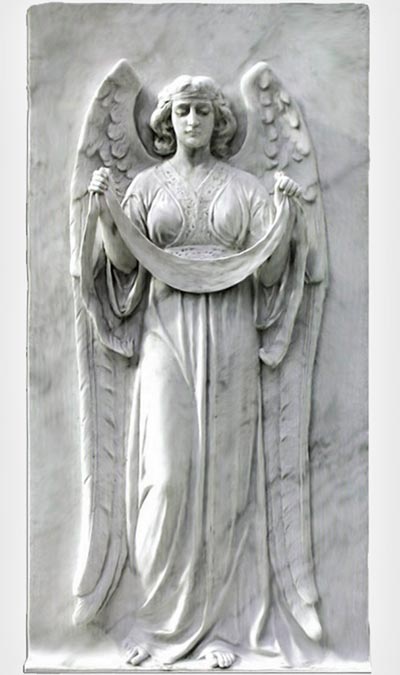
Philosophical epitaphs are collected here. Many of them - the author, including those composed for themselves. This literary genre is a monument in itself: philosophical poems preserve the memory of the deceased no worse than granite. On this link you can see samples of monuments to the grave in the form of a book in our catalog.
- "Sinless we come - and sin, Merry we come - and mourn. "We burn the heart with bitter tears, and go down in ashes, scattering life like smoke."
- "Yea, died in subjection to nature. But a thousand thoughts were in my soul. One of them extinguished - what little? "I live in the thousands that remain.
- "In the depths of heaven is a glass invisible to the eye; It is prepared there for each of us. Therefore, my friend, to its edges with thy lips, When thy hour cometh.
- "Two hundred years you live, or a thousand years, you'll still be a meal for the ants. "Whether you're dressed in silk or in rags, Padishah or drunkard, it makes no difference!"
- "Friend, don't worry about what's gone, Today's light shines on us. Tomorrow we shall all travel the unknown way, Following those who have gone in seven thousand years."
- "I may be dead, but I am a comfort to the world - I live in the hearts of thousands of souls. I am not touched by mortal decay, I am not ashes..."
- "And in him the soul kept a supply of bliss, anguish and passion. He is dead. Here is his grave. He was not made for men."
- "...And sweet to me, in my hours of suffering, to recall in silence the afterlife of an undying soul."
- "Life beyond the coffin does not torment me at all; flowing into the eternal something, it will no longer be me."
- "Sleep, thy rest shall not be interrupted. We are the edge of unknown roads. All through the rainy night, the shining hall burns."
- "There, in the blue, we'll meet our dawns, All our dreams will last. I will follow thee, believe me, my darling, and soon I will sail away in the same dream."
- "To the end of fate I am brought by death. And God would not see me old. My fate has no great gift - Anything but death would be my undoing."
- "Hear, friend, in the evening chime: Thou shalt not disobey thy fate! The nightingale on the maple whistles to us: Love and Death, Death and Love!"
- "And beside her hope rests, And the excitement of passions is gone, And the former years' enthusiastic strength, And the thirst for deeds, and the thoughts of youthful days."
- "...And I see clearly in those fateful moments, That life is waiting for an answer - and the answer is coming, That there is - curse, pain, dejection, oblivion, Dreadful separation, but death - no..."
- "For beauty that here is buried untimely, There is one consolation: Life has brought her mortal oblivion, And by death now life is returned."
- "So it is, and so it will be - Generations will be born, grow, and pass away... Both us and you, and this time the ages will erase from memory."
- "When you have comprehended all the mysteries of life, you will long for death, for it is nothing but another mystery of life."
- "Every Man's death diminishes me as well, for I am one with all mankind, and therefore never ask for whom the Bell rings: it rings for you."
- "Overcome death in life fleeting, and death shall die, but thou shalt abide forever."
- "There comes an hour when what you have lived takes on its true meaning, and you realize - it has helped you to come true."
- "Such pain cannot be expressed in words, It's all in my wounded heart. How cruel fate has dealt with us, Not allowing us to stay on earth together. But in my loneliness I long for you In the hot sun and when it rains I remember you, I love you And say to you: "See you later... Wait!"
- "Dry sand is your bed, Green turf is your blanket. Sleep in peace and eternal sleep Thou whose heart has so flamed..."
- "There's not many men like him, He succeeded in all things, He lived but very little, The Lord called him to himself."
- "Passerby you go, but you lie down as I do, Sit down and rest in my fence, Pick a little hair and remember your fate... I am home - you are a guest, Think of yourself."
Here you can see other samples of epitaphs:
- Short Epitaphs
- Epitaphs to Father
- Epitaphs to parents
- Epitaphs to a son
- Orthodox epitaphs
- Epitaphs to a mother
- Epitaphs for a daughter
- Epitaphs for a child
Quantities
Explaining complicated philosophical memes
The idea of the good, the global spirit, Russian cosmism, solipsism, analytical theology - we explain these and other notions with the help of funny pictures
Prepared by Arthur Tretiak, Grigory Chasovskikh
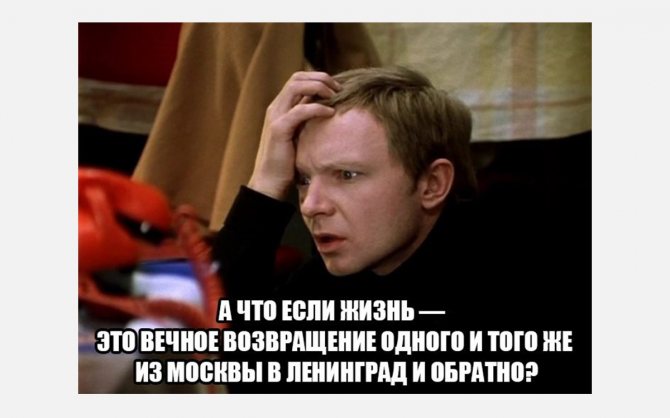

One of the basic and rather difficult concepts of Nietzsche's philosophy is the eternal return: "For all that can go - must it not go once more - this long way forward!" This is a quote from Nietzsche's novel Thus Spoke Zarathustra, which, apparently, was stumbled upon in a Leningrad apartment by the character of The Irony of Fate, Zhenya Lukashin. And now it seems to him that it is no accident that he and his friends go to the baths every New Year.
•


In popular culture, Archbishop St. Nicholas of Myra in Lycia is known as the Wonderworker and prototype of Santa Claus, but above all he was an active participant in the life of the Church in the 4th century, including the dispute about the nature of the Holy Trinity. For example, Arius and his supporters, the Arians, argued that the Holy Trinity is not one and indivisible, but similar, thus constructing a certain hierarchy between God the Son and God the Father. There is a legend that at the First Council of Nicaea St. Nicholas struck Arius for similar disrespect to the Holy Trinity. This is one case where a historical prototype may be more interesting than its fictional counterpart, Santa.
•


The main champions of ancient Greek rhetoric are Aristophanes, Socrates, Diogenes, and Zeno, shown in this picture. The latter very elegantly criticized the applicability of mathematical abstractions to reality in his paradoxical problems, the so-called aporia. One of the most famous, about Achilles and the tortoise, consists in the fact that Achilles will never be able to catch up with the tortoise, because with each step it catches up with him, the tortoise will have already put its leg one centimeter ahead.
•


The caption at the bottom: "All the pages are blank, what nonsense."
Philosophy asks us questions rather than solves them. Though philosophers certainly try to solve problems. Some - like Plato, Husserl, Hegel, Kant, Comte - are even sure that they succeeded. But immediately a crowd of critics appears, and among them there is bound to be the best student of the philosopher who questions the answers.
•


Descartes' famous expression "Cogito ergo sum" - "I think, therefore I am," or "I think, therefore I exist" - in short, about the fact that you can doubt everything except your own existence; if you suddenly stop thinking, you disappear instantly. The girl turns to Descartes and looks at him suspiciously, suggesting that he is thinking about something, but what is it? However, it is not so important: the main thing is that if he is thinking, then he is.
•


- Father, I started reading Genesis and Time. - Boromir would read Principles of Mathematics.
"The Principles of Mathematics is an unfathomable work on the logic and philosophy of mathematics by Englishmen Russell and Whitehead. Only true daredevils can master the three volumes, which is how the Viceroy of Gondor, Denethor II, sees his son Boromir in The Lord of the Rings. His youngest son Faramir has chosen the wrong treatise to impress his father, because the works of the German philosopher Heidegger, popular among unfashionable youth, in particular "Being and Time", are clearly not what a true son of Gondor should do. There is a classic contrast between the clear and logical analytical philosophy ("Principles") - and the vague, confused continental philosophy ("Being and Time").
•


In the philosophy of the Russian religious thinker, mystic and poet Vladimir Solovyov (1853-1900) one of the most important places was occupied by the concept of Sofia - the very essence of higher wisdom, which in its significance is close to the hypostasis of the Holy Trinity. The philosopher claimed that Sophia even appeared to him in a feminine form and was, of course, beautiful. Many students, however, are persistently skeptical of Russian philosophy: it is metaphorical, religious, and, to some, not very original compared to Western philosophy.
•


If you have seen the movie "The Matrix," you will not be surprised to think that the familiar reality may just be a convincing illusion. This picture is ironic of the positions of solipsism The ideas of solipsism are first seen in the Greek sophist-dosocratic Horgius of Leontinus (483-375 B.C.): solipsists believe that the only thing that really exists is individual consciousness. For example, the British philosopher George Berkeley (1685-1753), close to the ideas of solipsism, believed that the world as such is not given to us in the form of reality, but precisely as a set of feelings and sensations that depend not actually on external real objects, but precisely on our consciousness and the ideas of objects that arise in our heads.
•


The famous twentieth-century postmodernists (above left to right: Lacan, Sartre, Deleuze, Baudrillard) and Peppa the pig are riding bicycles along the road and are about to block the path of Heidegger, the chief German philosopher of the twentieth century and of German thought in general. Heidegger, in his philosophical project, sought to redefine the question of the role of philosophy in the world. Such things are never easy and come with a kind of violence. So he had no choice but to crash into philosophy at full throttle.
•


Sometimes the history of philosophy is likened to the various lines that go from one philosopher to another. By tracing these lines and comparing them, it is possible to judge the development of the history of philosophy and the connections between the various currents. But all currents have a point from which the path is first laid. As the British mathematician and philosopher Alfred North Whitehead said, "all philosophy is Plato's marginal notes. So Plato is the mighty wolf who walks at the forefront of the pack.
•


If you are careful, and in the characters of "Smeshariki" you can recognize the ancient Greek philosophers of the Ionian school Ionian school - a spontaneous and materialistic branch of ancient Greek philosophy that united philosophers who lived and taught in cities along the coast of the Ionian Sea... Heraclitus, Anaximander, Thales and Anaximenes also searched for the primary basis of the world and found it in different matter: Heraclitus sees fire as the basis of our world, Thales sees water, Anaximander sees apeiron, something formless and mysterious at the junction of other elements, while Anaximenes, his pupil, simply replaced apeiron with air because it was convenient and clear to everyone.
•


There is no mistake in the fact that the holy father asks the question, "What city are you from?" In On the City of God, Augustine the Blessed argues a great deal about what a city should be, by which we do not mean a specific territory, but rather a social structure. He also discusses what a city should not be. For example, a pagan city. And if there suddenly love another God, its inhabitants can also be beaten: Augustine is famous for the fact that it was in this treatise that he laid the foundation of the Christian model of the just war theory, where he justified the possibility to talk with pagans not only through sermons, but also in the language of the cudgel and stone.
•


The inscription on the left: "Everyone in Athens. On the right: "Socrates, constantly asking questions.
This is how the people of Athens perceived Socrates' endless questions about the good, justice, and virtues, to which they could find no answer. Socrates' sharp method criticized the moral foundations of the Athenians, and the people of Athens sentenced him to death for blasphemy (believing that he did not honor the gods the city honored) and corrupting the youth (inventing new deities).
•


The inscription on the left: "Hegelians." On the right: "Hegelian."
In a shot from the filming of the blockbuster movie Spider-Man: Far From Home, actress Zendaya, who plays M.J., doesn't seem thrilled by the lead actor's intrusive explanations. This is the same face Hegel might have had if he had heard the explanation of his philosophy by his own followers, the Hegelians. In their view, Hegel's ideas have become something very distant from himself, and sometimes even hostile and materialistic, such as Feuerbach or Marx.
•


The idea is central to Plato's philosophy. He regarded philosophers as people who are the best in every way. They have a good understanding of what is going on in the world, so it would be nice if philosophers were the rulers. And they also have access to a higher world of ideas, in which only ideal prototypes of our world live.
•
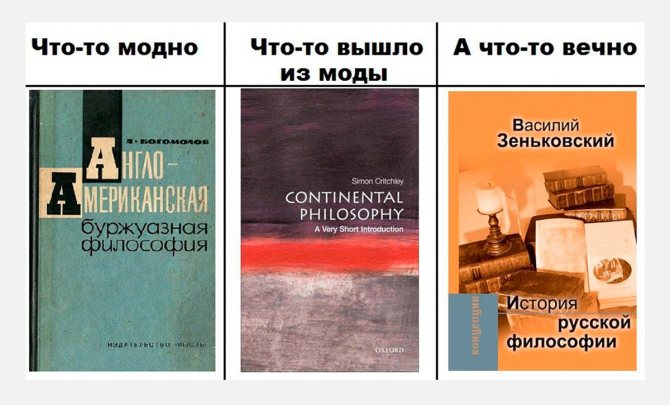

Two philosophical trends are competing in the modern world: analytical, which relies on methods of logical and linguistic analysis of language to solve philosophical problems, and continental, which relies more on the analysis of experience. Russian philosophy stands apart. One of the most famous scholars of Russian thought, Vasily Vasilyevich Zenkovsky (1881-1962), thought of it as an original and distinctive tradition. This meme ironizes the skepticism toward Russian philosophy on the part of much of the generation of young thinkers.
•


Propositional logic, or the logic of statements, is one of the basic logical models that first-year students of logic deal with. Faced with logic problems full of incomprehensible signs and variables, they are horrified. When solving such problems, the main thing is to build truth tables meticulously: this is a simple way to understand the truth and falsity of various logical functions. But there is always a brave guy who decides not to build such tables: following his intuition, he can easily find the right answer.
•


The representative of atheistic existentialism, Jean-Paul Sartre, named his cat Nothing. Here the Nothing looks at us as if Sartre owns it and writes down his thoughts on paper.
•


Many people, taking up Heidegger's texts (the radiant figure in the upper right corner), hope that they are about to discover the truth of being. However, the vague poetic language of his works is often beyond their grasp. One of the philosopher's main tasks is to bring us into a state of authentic being: according to Heidegger, most people are unable to ask questions about being, or even about our very ability to ask such questions, so their being is not authentic.
•


Now, when some universal abstract entities are spoken of, they are not usually personified. Although, for example, God is usually portrayed as a white, bearded man "in the image" of man. For the German philosopher Georg Wilhelm Friedrich Hegel, the absolute spirit, a certain abstract soul of world history, could materialize in real historical characters. Thus Hegel was once impressed by Napoleon, and a hero who makes history here and now better fits the description of the spirit of the time than a blue humanoid.
•


Cosmism Cosmism - A series of religious-philosophical, mystical, aesthetic, and scientific-futurological currents of the early 20th century. It is based on the idea of a human being and mankind as elements united with the cosmos and developing together with it according to certain laws. - intellectual phenomenon, which in Russia has acquired especially many adherents - combines seemingly incompatible things: religious orthodox metaphysics and the desire for scientific knowledge of the world. Philosophy is situated somewhere in the middle, but it plays its own tune for cosmologists, and they fall into a romantic dream of populating outer space with resurrected people.
•


In the history of thought, Plato became famous for being the first to offer a full-fledged (albeit utopian) project of an ideal state. He also advised keeping a philosopher at the political helm. And certainly there is no better candidate than Plato himself, in his own opinion. His political career did not work out in Athens, and he went to Syracuse at the invitation of the local tyrant Dionysius. Dionysius was a conscientious man - and even began to live more modestly. But he could not build an ideal state, and instead of an enlightened tyranny people got an erudite tyrant. It is indeed reminiscent of modern slogans: during the recent presidential election, for example, a bot spread around the Internet a message that immediately became a meme, saying that he had never gone to the elections, but that he would definitely go this time - to vote for one of the candidates because he was "the candidate of the people.
•
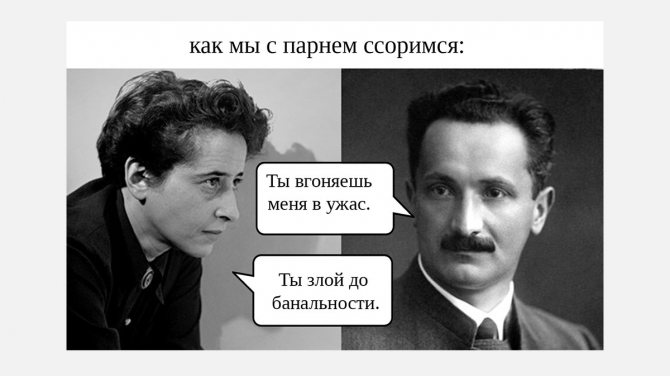

"The Banality of Evil" is one of Hannah Arendt's most famous works (that's her in the picture at left). It makes the paradoxical claim that evil is not something diabolical and terrible, evil happens to us when we are thoughtless and unthinking, blindly following rules and protocols, that is, when we are just trivial, so such a rebuke is really serious. And driving into Terror, according to Martin Heidegger, reveals the Nothingness itself, a path to understanding the key questions of metaphysics, in particular of being as it is.
•


Here again the representatives of the continental and analytical strands of political thought are confronted. There were many leftists among the Continentals, like Jean-Paul Sartre, Antonio Gramsci, and György Lukács. It turns out that they were true defenders of freedom, ready to go to the barricades even because of the increase in the price of coffee in the university cafeteria. And analysts, according to them, do nothing but deal with their mathematical problems and generally enjoy all the benefits of capitalism.
•


Choosing Auguste Comte, the founder of sociological science, as your favorite philosopher, you can easily find common ground with a girl who is not particularly fond of philosophy: Comte was very skeptical of philosophy and believed that it should be replaced by positive knowledge, that is, knowledge based on modern science, which, in his opinion, can actually give something to humanity, unlike philosophy.
•


"What can I know?", "What should I do?", "What can I hope for?" - are the basic questions of Immanuel Kant's philosophy. They are crowned by the fourth - and most important: "What is man?
•


This is a prime example of the enduring popularity of Michel Foucault's philosophy among the younger generation. After him, we have gained a new perspective on traditional institutions, because, according to Foucault, schools, hospitals, universities, and other institutions are places where the disciplinary power that controls our bodies and thoughts is actualized.
•
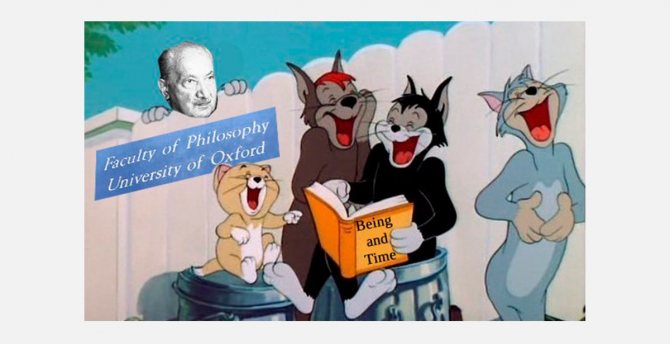

The inscription on the left reads: "Department of Philosophy, University of Oxford. In the paws of the cat is Heidegger's Being and Time.
A company of analytical thinkers from Oxford laughs at the German mystic Heidegger's intricate treatise Genesis and Time (peeking over the fence). To a self-respecting analyst, such reading is merely literary criticism or an attempt to pose some pseudo-problems. Real philosophy, for the Oxford gentleman, is stated in simple and clear language, can be described in formulas and graphs, and must be decomposed into logically solvable cases.
•
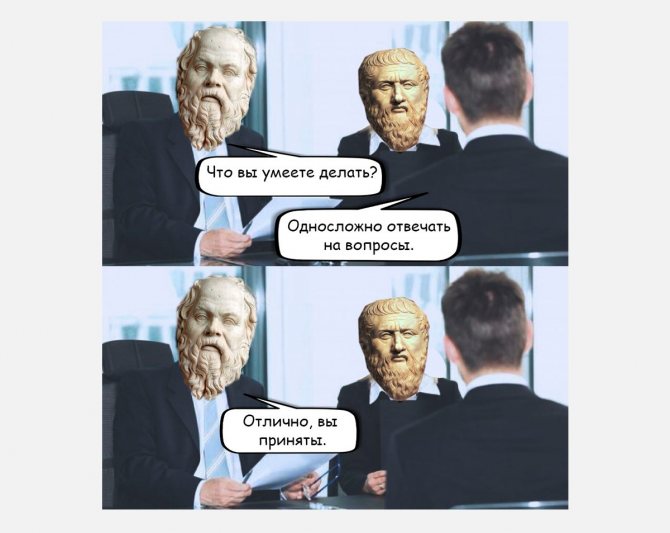

Socrates' dialectic is a way of grasping the truth through dialogue. With the help of the art of leading questions - mayeutics and irony - this ancient philosopher helped his interlocutor to come to the truth himself. However, in Plato's Dialogues this method is demonstrated in a rather prosaic manner: most of the answers of Socrates' interlocutors are simple exclamations like "Verily so!" or "You're right, Socrates!


